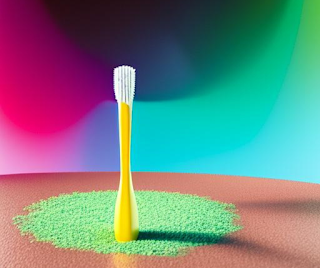A toothbrush can contain up to 10 million bacteria.
Toothbrushes are an essential tool, but they can also be a potential source of infections.
A toothbrush can contain an average of up to 10 million bacteria. Therefore, regardless of a person's health, using a toothbrush causes the bristles to accumulate many bacteria, including oral, respiratory, environmental, or digestive tract pathogens. This toothbrush contamination can become a potential source of infection and disease transmission.
The toothbrush is an excellent ally for daily oral hygiene if the brushing technique is correct and the toothbrush is in good condition. When toothbrush filaments become deformed, they lose effectiveness and damage teeth and gums. Therefore, a toothbrush in perfect condition guarantees effective oral hygiene. For this reason, renewing the toothbrush every three months is recommended. In this way, we also prevent the toothbrush from becoming a reservoir of bacteria.
A study at the DENTAID Research Center published in the International Journal of Dental Hygiene shows the effectiveness of chlorhexidine (CHX) and cetylpyridinium chloride (CPC) in reducing microorganisms.
This study demonstrates CHX 0.05% + CPC 0.05% antiseptic efficacy in reducing many bacteria. After immersing brush heads, used for two weeks, in 15 ml of 0.05% CHX + 0.05% CPC for two hours, it causes a significant reduction in the percentage of live bacteria to present between the brush filaments. "
Since pathogens can be found among these bacteria, reducing their number reduces not only the probability of infection but also reduces the risk of transmission of these pathogens to other members living in the same household. Or even in case of suffering certain infectious diseases of oral transmission, the renewal of the brush could accelerate the recovery of the person"explains Dr. Gerard Àlvarez, one of the study's authors.
These results make us aware of the importance of maintaining good daily oral hygiene to help control the accumulation of millions of bacteria in the oral cavity, thus avoiding possible oral and systemic complications. It is essential to have a toothbrush in perfect condition to ensure its function: removing food debris and dental plaque. Hence, renewing the toothbrush every 3 months or after an infectious episode, such as a cold or flu, is necessary. Likewise, this study has made it possible to observe the antiseptic properties of mouthwashes in reducing viruses and bacteria, confirming their preventive function in the control of biofilm (bacterial plaque) found on teeth and gums.
Carrying out a good daily oral hygiene routine will help protect oral health and prevent possible oral and systemic diseases since any affectation in the oral cavity could affect general health.

